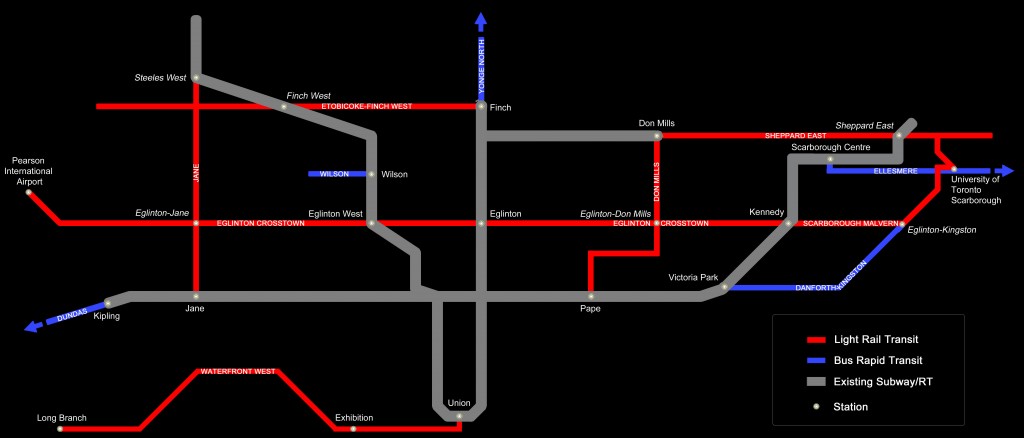Cavalluzzo Hayes Shilton McIntyre & Cornish released a legal opinion today concluding that Toronto Mayor Rob Ford did not have legal authority to cancel Transit City. Â The opinion concludes that the mayor does not have independent power to bind the city, and only exercises power delegated by council or specific legislative responsibility.
Also see Pulat Yunusov’s previous post, What can the mayor of Toronto really do?
The Executive Summary of today’s opinion follows:
Throughout the period 2007 to 2010, the Toronto Transit Commission (the “TIC”) and the Toronto City Council (“City Council” or “Council”) received reports, considered, and voted on aspects of what was commonly known as Transit City. They designated four priority projects. They voted funding allocations for these projects. City Council declared Transit City its first priority with respect to transit.
On December 1, 2010, newly elected Mayor Ford, without the approval of City Council, purported to cancel Transit City. He directed that work on Transit City be stopped, and that resources be allocated to other projects as he directed. The TIC followed this direction. On or about March 31, 2011, again without the approval of City Council, Mayor Ford purported to enter into a Memorandum of Understanding (the “Mayor’s MOU”) on behalf of the City of Toronto with the Province of Ontario and Metrolinx, the province’s transportation agency.  Under the Mayor’s MOU, Mayor Ford purported to confirm the intent of the City of Toronto to end Transit City, make alternative transit plans, and reimburse Metrolinx for non recoverable sunk costs associated with the direction of City Council to implement Transit City. There are two major issues with respect to Mayor Ford’s conduct with respect to Transit City. First, he did not follow the proper procedure for obtaining City Council’s authorization to rescind Transit City and develop and approve an alternate plan. Second, he purported to enter into the Mayor’s MOU on behalf of the City of Toronto without City Council’s approval, and, more importantly, appears to have acted on the Mayor’s MOU without first obtaining the authorizations the document itself requires to be operational.
As we further discuss below, Mayor Ford did not have the authority, without the approval and direction of City Council, to:
1. Cancel Transit City;
2. Direct the TIC Chief General Manager to redirect resources away from
Transit City initiatives;
3. Direct the TIC to develop a new transit plan; and
4. Sign the Mayor’s MOU purporting to establish the intent of the City of Toronto to end Transit City and make alternative transportation plans, when Council’s intent to date as established by Council resolutions is to support Transit City.City Council, of which Mayor Ford is a part, has the authority to do those things. It has not done so. The Mayor has not taken these initiatives for approval to City Council. Under the City a/Toronto Act, the power of the City resides in City Council. The Mayor of Toronto has very little independent authority beyond his role as head of City Council. Unless specific power is delegated to him, the Mayor does not have the authority to speak for the City independently.
Below, we discuss the history of Transit City, with particular focus on the steps taken by City Council to approve and implement the program. We then discuss the municipal legal framework with respect to the authority of the Mayor of the City of Toronto. We conclude by examining the steps taken by Mayor Ford since December 1, 2010 to determine whether he had the authority to do the acts he has purported to do.

